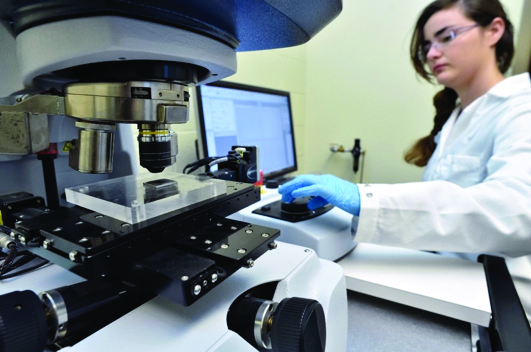Materials Performance Testing
Materials Performance Testing
Materials Performance Testing is performed to understand corrosion and materials degradation resistance of a variety of materials. Our wide range of testing equipment allows NCERCAMP researchers to accelerate corrosion processes while testing a material's mechanical properties and its performance in high-temperature environments.
Accelerated Testing
- Expose coated and uncoated panels to aggressive environments to analyze corrosion resistance
- Accelerate damage and predict the material’s performance
- Material degradation/corrosion processes are accelerated significantly under extreme environmental conditions
- Tests simulate effects of sunlight, dew and rain, generating weathering data in a few weeks or months
- Performance of metals, polymers and coatings for damage including color change, gloss loss, chalking, cracking, crazing, hazing, blistering, embrittlement, strength loss and oxidation
Mechanical Testing
- Evaluate electrochemical, physical and mechanical properties of coatings
- Qualification of hardness of films and coatings of materials varying from polymers to metals
- Determination of coating adhesion to substrate through nanoscratch testing
- Determination of coating failure mechanisms
- Highly localized determination of dynamic mechanical properties
- New techniques for testing reliability of commercial alloys
- Fatigue crack growth, high-cycle fatigue, low-cycle fatigue, fracture toughness, tension and compression
High-Temperature Testing
- Simulate operating stresses experienced in a pressurized water reactor system that is complete computerized
- High-temperature, high-velocity (up to Mach 2) burner rig testing with capability for sand ingestion
- Stressed oxidation testing under high-velocity, high-water-content atmosphere up to 1450°C
- Thermal-barrier-coated (TBC) superalloy system and ceramic matrix composite evaluation
- Understand influence of temperature on structure of metal
- Continuous measurement of oxidation kinetics as well as change in metal structure
- Heat treatments of materials in wide range of atmospheres and temperatures

A Corrosion Engineering student performs hardness testing on a micro-indenter.
Contact NCERCAMP
Address
264 Wolf Ledges Parkway
Akron, Ohio 44325
Telephone
Office: 330-972-6978
Fax: 330-972-5141
